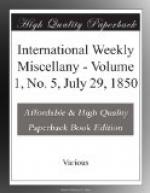THE LATE HON. NATHANIEL SILSBEE, according to the Salem, Mass. Gazette, of the 16th inst., began his career soon after the breaking out of the French revolution, and the general warfare in which all Europe became embroiled. At this favorable point of time, Mr. S. having finished his term of service at one of our best private schools of instruction, under the Rev. Dr. Cutler, of Hamilton, and having abandoned the collegiate course for which he had been prepared, and been initiated into the forms of business and knowledge of the counting-room, he engaged in the employ of one of our most enterprising merchants, Hasket Derby, Esq., the leader of the vanguard of India adventures. At the age of 18, he embarked on the sea of fortune as clerk of a merchant vessel. On his next voyage he took the command of a vessel, and before he arrived at the age of 21, he sailed for the East Indies in a vessel, which, at this day, would scarcely be deemed suitable for a coasting craft, uncoppered, without the improved nautical instruments and science which now universally prevail, trusting only to his dead reckoning, his eyes, and his head, not one on board having attained to the age of his majority. He served successively as representative in our State Legislature, as member of Congress for six years, as State Senator, over which body he presided, and as Senator in Congress, for nine years, with honor to himself, and satisfaction to his constituents. In all commercial questions which presented themselves to the consideration of Congress, while a member of both houses, no man’s opinion was more sought for and more justly respected.
* * * * *
SEVERAL FAMOUS FRENCHMEN have left the world within a few weeks. Quatremere de Quincy, who was in the first rank of archaeology and aesthetics, died at the age of ninety-five; Count Mollien, the famous financier—often a minister—at eighty-seven; Baron Meneval, so long the private, confidential, all-trusted private secretary of Napoleon, between seventy and eighty; Count Berenger, one of the Emperor’s Councillors and Peers, conspicuous for the independence of his spirit, as well as administrative qualifications, was four-score and upward. The obsequies of these personages were grand ceremonials. President Napoleon sent his carriages and orderly officers to honor the remains of the old servants of his uncle. This class might be thought to have found an elixir of life, in their devotion to the Emperor or his memory. A few of them survive, like Marshal Soult, wonders of comfortable longevity.
* * * * *
REMARKABLE WORK BY A CHINESE.
To the man of science, the philanthropist and the Christian, it will prove a stirring incident that a work on Geography has just been issued by a native Chinese, embracing the history and condition of other nations. Here is a stroke, such as has never yet been dealt against the ignorance and prejudice which has erected such a wall of exclusiveness around three hundred millions of people. A Lieutenant Governor is the author, and, by a commendatory preface, it is pressed upon the notice of his countrymen by a Governor General—both of these men high in office in the Chinese Government.




